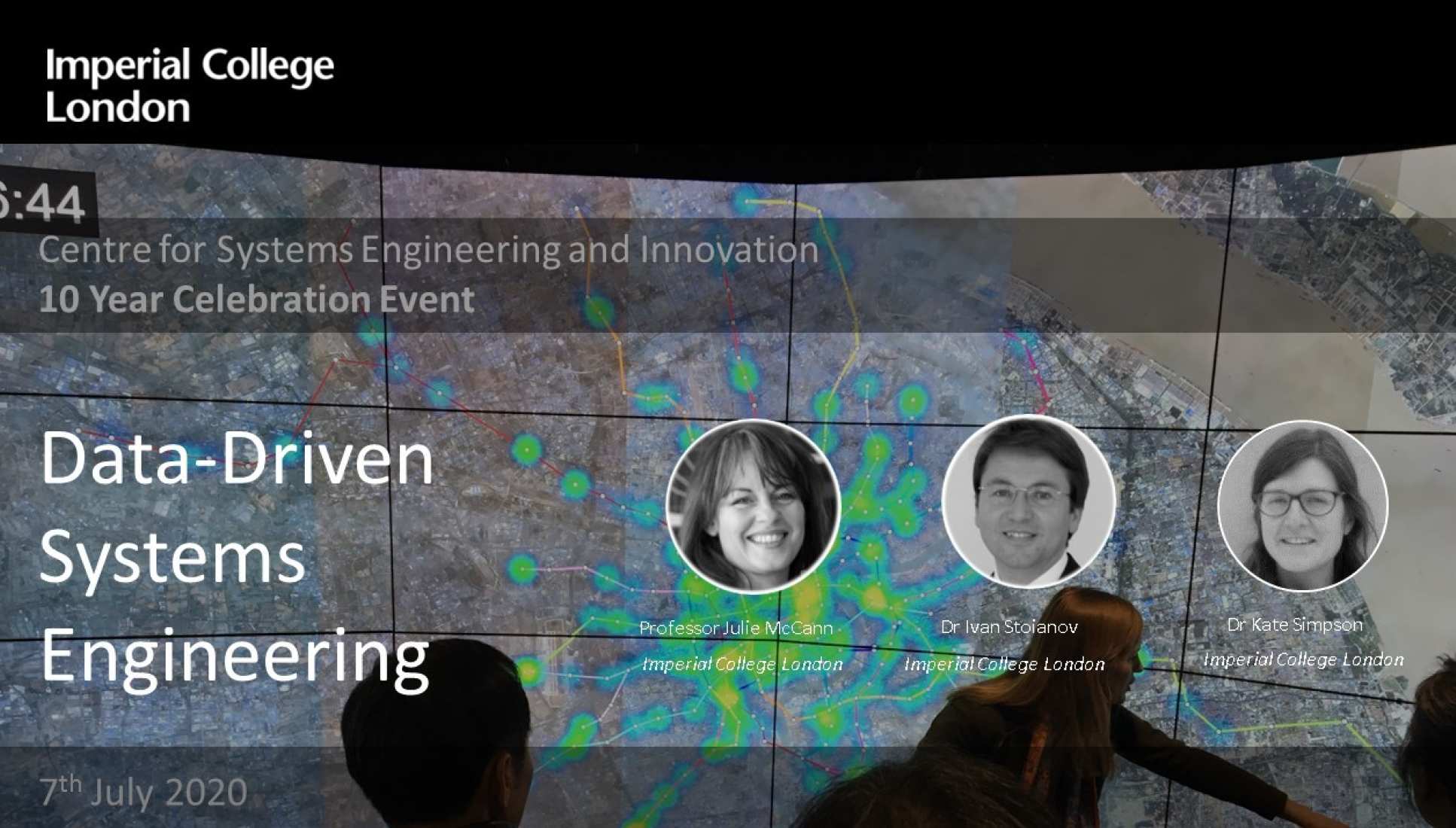Digital technologies both facilitate the effective running of our infrastructure and provide incredible opportunity for improvements in the way we deliver and manage it. How we approach the challenge of leveraging the potential that lies in our use of data-driven systems without being limited by the way it is applied is crucial to optimising its value.
7th July, 10.10 – 10:30 Data-Driven Systems Engineering Panel, 10:30 – 10:50 Breakout.
Main page
Full agenda
Panel: Professor Julie McCann (Chair)
 She heads up the Adaptive Emergent Systems Engineering (AESE) group in the Dept of Computing where she leads a highly multi-disciplinary group of Post Docs and PhD students. From this she leads the Resilient and Robust Infrastructure challenge part of the Data Centric Engineering theme in the Alan Turing Institute, she is PI for the NRF funded Singapore Smart Sensing project, and the Logistics 4.o project with PeTraS and the Tate Modern. She is Imperial PI for the EPSRC Science of Sensing Systems Software (S4) programme grant, and Co-Director of the Digital Oceans project with the China Shipbuilding Industry Corp. Until recently she was Co-director of the Intel Collaborative Research Institute on Sustainable Connected Cities and Co-PI of the NEC Smart Water Lab. She is currently Director of the cross-Imperial Smart Connected Futures Network.
She heads up the Adaptive Emergent Systems Engineering (AESE) group in the Dept of Computing where she leads a highly multi-disciplinary group of Post Docs and PhD students. From this she leads the Resilient and Robust Infrastructure challenge part of the Data Centric Engineering theme in the Alan Turing Institute, she is PI for the NRF funded Singapore Smart Sensing project, and the Logistics 4.o project with PeTraS and the Tate Modern. She is Imperial PI for the EPSRC Science of Sensing Systems Software (S4) programme grant, and Co-Director of the Digital Oceans project with the China Shipbuilding Industry Corp. Until recently she was Co-director of the Intel Collaborative Research Institute on Sustainable Connected Cities and Co-PI of the NEC Smart Water Lab. She is currently Director of the cross-Imperial Smart Connected Futures Network.
Dr Ivan Stoianov

Dr Ivan Stoianov is a Senior Lecturer in Water Systems Engineering and a holder of a prestigious five-year EPSRC Fellowship (2017-2021).
Through this EPSRC Fellowship, fundamental scientific methods for the design, optimisation and control of next generation resilient water supply networks that dynamically adapt their connectivity (topology), hydraulic conditions and operational objectives will be developed and experimentally investigated. A dynamically adaptive water supply network can modify its state in response to changes in the operational conditions, performance objectives, an increase in demand and a failure. This is a new category of engineering (cyber-physical) systems that combine physical processes with computational control in a holistic way in order to achieve dynamic adaptability, resilience, efficiency and sustainability.
The research is supported by Bristol Water, Severn Trent Water, Dwr Cymru Welsh Water, Anglian Water, Water Essex and Cla-Val. Previous partners include NEC, Intel Research, SAP, ABB, Essex and Suffolk Water and Thames Water Utilities.
Dr Kate Simpson

Kate is a research associate on the Design for Retrofit project, within the Data-Driven Design Under Uncertainty challenge on the Data Centric Engineering Programme at The Alan Turing Institute, based between the Dyson School of Design Engineering and the Centre for Systems Engineering and Innovation (CSEI). She is Principal Investigator on a project identifying eco-innovation in the building retrofit sector using patent mining, funded by the CSEI. Kate’s PhD from the London-Loughborough Centre for Doctoral Training in Energy Demand on low-rise dwelling retrofit combined methods to understand the retrofit experience plus the measured and modelled impact of energy demand, indoor environment and building performance. Kate initially worked as a building surveyor and now has experience in both technical and social research relating to fuel poverty alleviation, retrofit skills, offsite housing and smart city development at UCL Energy Institute, University of Leeds and the Centre for Sustainable Energy. Kate is actively engaged with the retrofit sector, particulalrly micro to small businesses, citizens, local authorities and policy makers.
CSEI Data Driven Systems Engineering
Breakout room - Data-driven Systems Engineering - https://zoom.us/j/91361293126
Moderated by Professor Timo Hartmann, Professor of Systems Engineering, TU Berlin and Professor Chris Tucci, Professor of Digital Strategy & Innovation at Imperial College Business School
Notes by Ranjith Soman